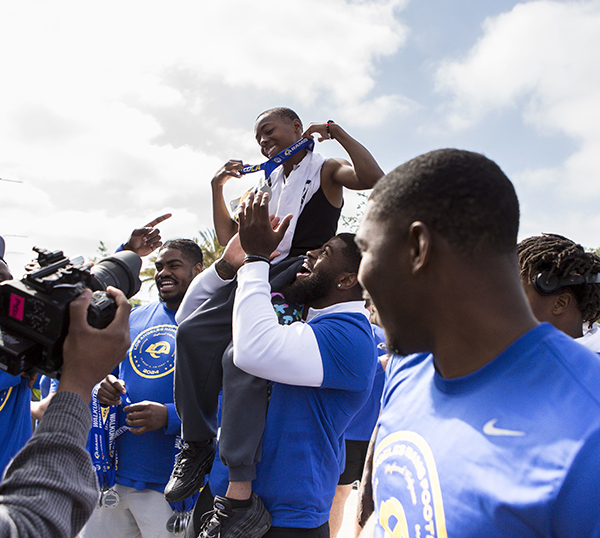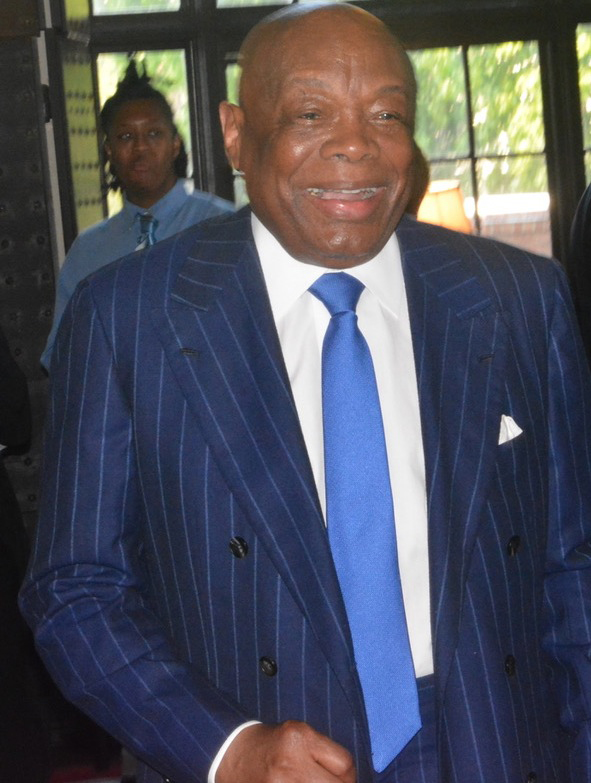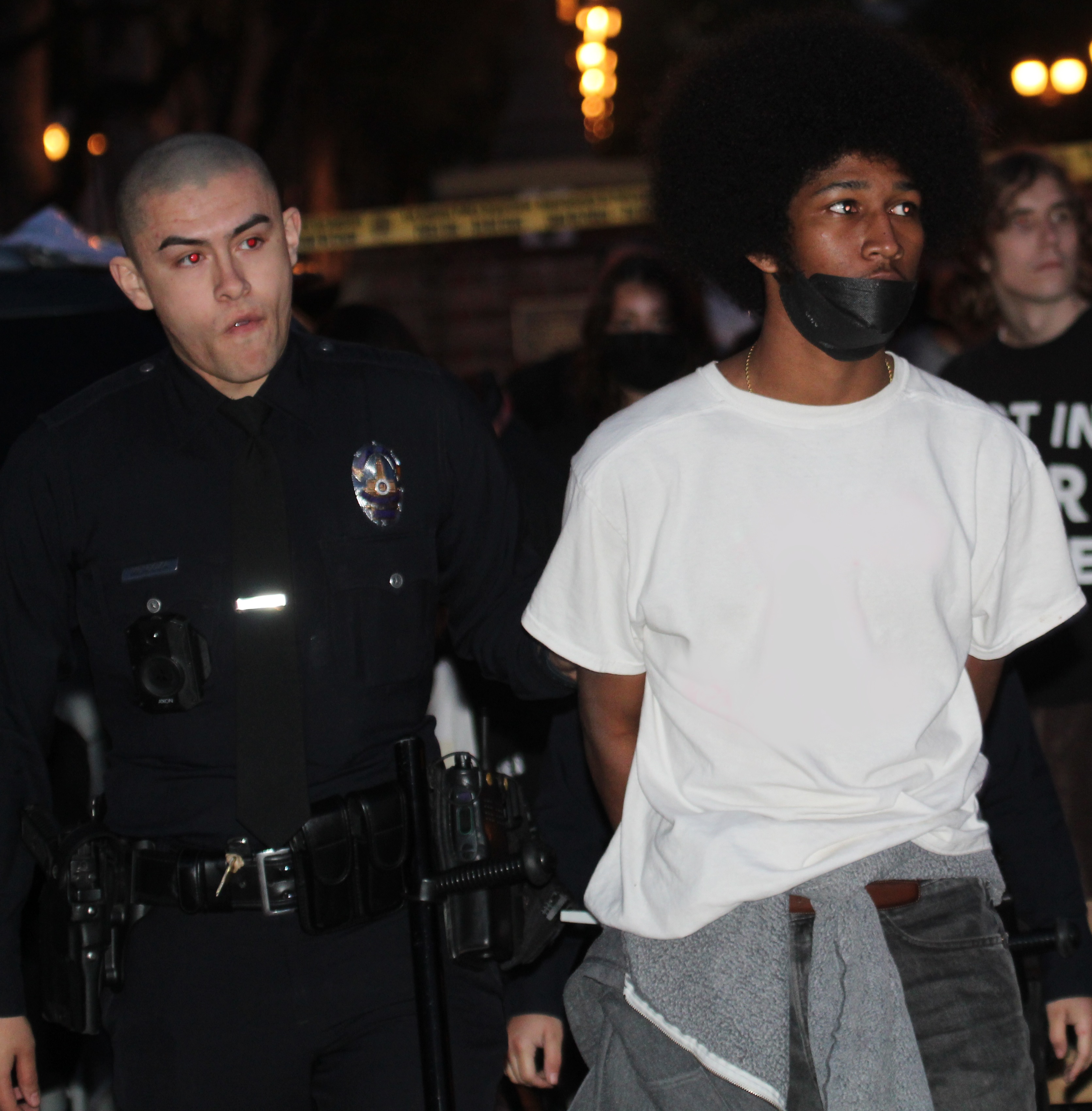Wave Staff and Wire Reports
LOS ANGELES — A week of intensified student protests over the Israel-Palestine conflict escalated overnight at UCLA April 30 when an encampment of pro-Palestinian supporters was attacked by counter protesters resulting in a melee that caused university officials to cancel classes May 1 and caused Mayor Karen Bass to cut short a trip to Washington, D.C., to ease tensions at both UCLA and USC.
The increased tensions related to the latest conflict in the Middle East comes less than a week after a new survey indicated that a growing number of Black Americans feel a sense of solidarity with the plight of Palestinians, according to a report on the Grio.
The Carnegie Endowment for International Peace released a survey April 25, that showed that 45% of Black Americans say they feel “connected” to Palestinians, up from 32% in an October survey after Hamas’ unexpected Oct. 7 attack on Israel.
The survey said more and more Black Americans feel a sense of solidarity with the plight of Palestinians and want to see an immediate and permanent ceasefire between Israel and Hamas in Gaza.
The protests at UCLA — which began when an encampment was established on campus April 25 — erupted late April 30 when counter-protesters launched an offensive against the encampment. People were seen attacking others with sticks, while fist-fights and wrestling matches ensued, and the violence continued seemingly unchecked by police. Pepper spray or bear repellent was also reportedly deployed, although it was unclear by whom.
Police in riot gear eventually moved in around 3 a.m. and managed to separate the factions and restore order. It was unclear if there were any arrests. Video showed several people nursing injuries from the clashes, but the severity was unclear.
Bass flew overnight from Washington to meet with various law enforcement agencies on campus to discuss “the absolutely detestable violence on campus last night.”
“LAPD is supporting regional law enforcement on next steps to ensure our students and campus are safe,” Bass said in a statement. “There must be a full investigation into what occurred on campus last night. Those involved in launching fireworks at other people, spraying chemicals and physically assaulting others will be found, arrested, and prosecuted, as well as anyone involved in any form of violence or lawlessness.
“I want to make sure the message I delivered to law enforcement and other officials earlier today is clear: Free speech will be protected. Violence and bigotry will not.”
In a message to the UCLA community May 1, UCLA Chancellor Gene Block called the overnight clashes the result of “instigators” who came to the campus to “forcefully attack the encampment.”
“However one feels about the encampment, this attack on our students, faculty and community members was utterly unacceptable,” Block said.
The overnight incident came after a clash April 28 between pro-Palestine and pro-Israel activists. A barrier that was erected in an effort to separate the dueling groups was breached, leading to shoving matches and some fights.
The Israeli American Council, along with several other Jewish organizations, had sponsored a late-morning rally to show support for Jewish students after days of often intense pro-Palestinian protests at campuses across the United States, including at USC.
The situation at USC took a turn for the worse April 24 when nearly 100 people were arrested on campus following a daylong “occupation” by pro-Palestinian protesters of Alumni Park, the site of the annual main commencement ceremony.
Organizers of the protest had planned to camp in the park and remain in place until the university met a series of demands, including divestment from Israeli-tied organizations, cancellation of Israeli study-abroad programs and issuance of a university statement calling for an immediate and permanent ceasefire in the Israel-Hamas war.
The protest also was fueled in part by USC’s decision to prevent valedictorian Asna Tabassum from speaking at the commencement ceremony following complaints about online posts that critics called antisemitic, including a call for the abolition of Israel.
Despite protest organizers’ intent to remain camped at the park, campus Department of Public Safety and Los Angeles Police Department officers cleared protesters from the area that night. Police said 93 people were ultimately arrested for ignoring repeated police orders to disperse.
USC Provost Andrew Guzman announced the decision earlier this month to bar Tabassum from speaking at commencement, insisting it was strictly a public safety decision, not a political one.
But the move drew condemnation from groups including the Muslim Public Affairs Council, the Council on American-Islamic Relations-Los Angeles and the ACLU of Southern California.
As tensions continued to build, USC announced April 26 it was “redesigning the commencement program,” and it would no longer include any outside speakers or honorees.
Just outside the USC campus April 29, community activist Earl Ofari Hutchinson, president of the Los Angeles Urban Policy Roundtable, held a news conference calling on USC President Carol Folt to engage in an emergency campus dialogue with students over the Middle East conflict and students’ demands.
“The last week or so, there’s been chaos, there’s been turmoil, there’s been violence, there’s been destruction,” Hutchinson said.
He acknowledged that Folt issued a statement responding to the protests, but he said she has not been “proactive” in working with students and that an “emergency campus dialogue” is needed.
“You don’t want to have to call the LAPD in every time,” Hutchinson said. “The issue is not going to go away. You’ve got a lot of passion, you’ve got a lot of anger.”
Responding to the UCLA incident, Gov. Gavin Newsom’s office issued a statement May 1 saying, “The limited and delayed campus law enforcement response at UCLA last night was unacceptable and it demands answers. As soon as it became clear that state assistance was needed to support a local response, our office immediately deployed [California Highway Patrol] personnel to campus.”
Newsom himself issued a statement condemning the violence that erupted on the campus.
“The law is clear: The right to free speech does not extend to inciting violence, vandalism or lawlessness on campus,” he said. “Those who engage in illegal behavior must be held accountable for their actions — including through criminal prosecution, suspension or expulsion.”
Assemblyman Rick Chavez Zbur, D-Hollywood, whose district includes the Westwood campus, also lashed out at UCLA administrators, saying he and his staff have “pled” with the university for adequate security measures to protect students.
“While we continue to gather all the facts, one thing is abundantly clear: the UCLA administration has failed in their most important duty — to protect the safety, well being, and civil rights of all students on campus,” Zbur said.
Organizers of the UCLA Palestine Solidarity Encampment, similar to their counterparts at USC, have issued a list of demands calling for divestment of all University of California and UCLA Foundation funds from companies tied to Israel, along with a demand that the university call for an immediate and permanent ceasefire in the Israel-Hamas war and begin an academic boycott against Israeli universities, including a suspension of study-abroad programs.
The UC issued a statement April 26 noting that the university has “consistently opposed calls for boycott against and divestment from Israel. While the university affirms the right of our community members to express diverse viewpoints, a boycott of this sort impinges on the academic freedom of our students and faculty and the unfettered exchange of ideas on our campuses.
“UC tuition and fees are the primary funding sources for the university’s core operations. None of these funds are used for investment purposes,” the statement continued.
Block, who is stepping down as chancellor at UCLA at the end of July, is expected to testify before Congress later this month about the campus’ response to antisemitism and actions to protect Jewish students.









